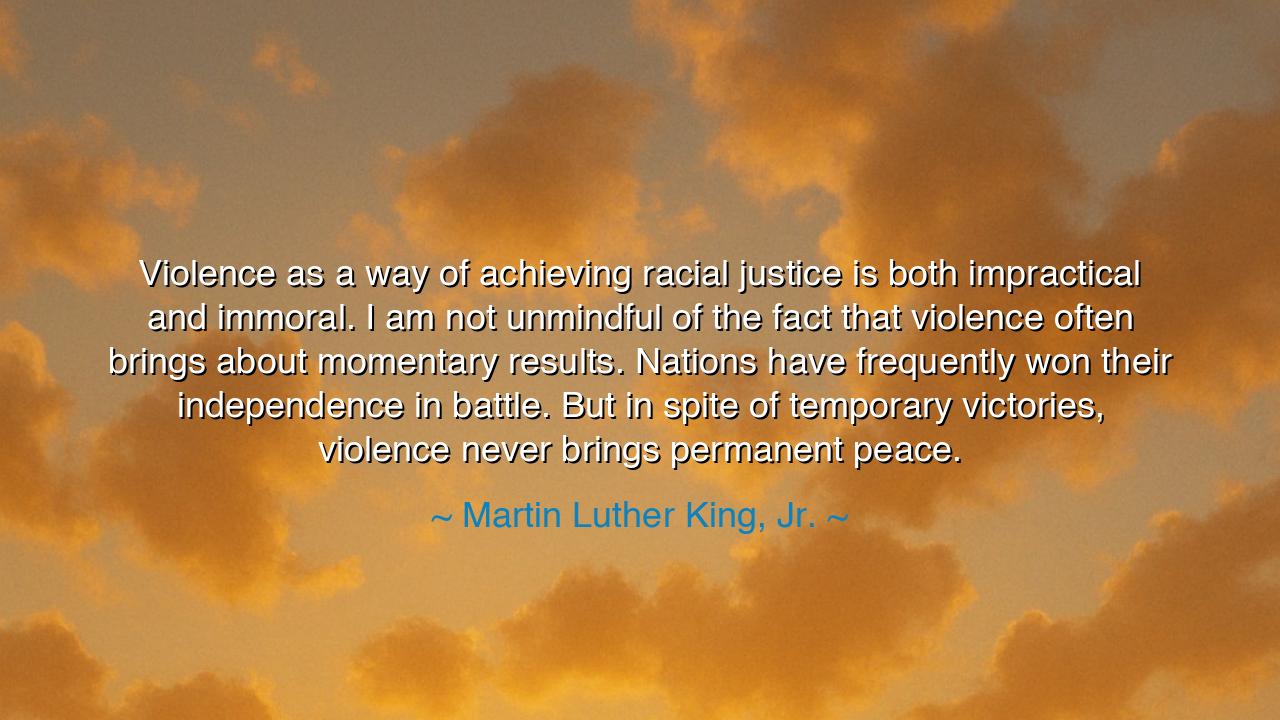
Violence as a way of achieving racial justice is both impractical
Violence as a way of achieving racial justice is both impractical and immoral. I am not unmindful of the fact that violence often brings about momentary results. Nations have frequently won their independence in battle. But in spite of temporary victories, violence never brings permanent peace.






Hear now the immortal words of Martin Luther King, Jr., prophet of peace and torchbearer of justice: “Violence as a way of achieving racial justice is both impractical and immoral. I am not unmindful of the fact that violence often brings about momentary results. Nations have frequently won their independence in battle. But in spite of temporary victories, violence never brings permanent peace.” In these words, thunder meets light — strength tempered by compassion, wisdom born from struggle. Dr. King speaks not only as a leader of a movement, but as a seer of the human condition, revealing the eternal truth that peace built on blood is fragile, and that justice born from violence is a flower with poisoned roots.
The ancients, too, understood this. The sages of India spoke of ahimsa, the sacred principle of non-violence, teaching that true victory lies not in the destruction of one’s enemies but in the conquest of hate within oneself. Dr. King, following the path of Mahatma Gandhi, took this ancient light and carried it into the heart of a divided America. He knew that while violence can shatter chains, it cannot heal hearts. He saw that every revolution waged with the sword gives birth to new tyrannies, while every act of love and truth sows the seed of lasting freedom. His words rise from the soil of history and the ashes of conflict to remind us that peace, if it is to endure, must be won through the courage to forgive, not the will to destroy.
Yet Dr. King does not speak as one naïve to suffering. He knew the fires of injustice; he walked through mobs of hatred; he faced the lash of persecution. He did not deny that violence can bring “momentary results” — for indeed, nations have won their independence in battle. The American Revolution, the wars of decolonization, the uprisings of oppressed peoples — all bore witness to the power of arms to change circumstance. But Dr. King, in his divine discernment, looked beyond the surface of history. He saw that though empires may fall and flags may change, the hatred that fuels violence always lingers beneath, waiting for its next eruption. The sword, though it cuts swiftly, never heals the wound it creates.
Consider the fate of Rome, the mightiest empire of the ancient world. It rose by conquest, claiming dominion through legions and fire. Yet its peace — the Pax Romana — was built not upon understanding, but submission. And so it fell, not by foreign armies alone, but by decay from within. Rome’s momentary victories could not save it from its moral collapse. So too, Dr. King warns, if justice is achieved through violence, it carries within it the seeds of its own undoing. True peace, he teaches, is not merely the absence of conflict, but the presence of justice, born through reconciliation, compassion, and courage.
In his own life, Dr. King bore witness to the power of non-violence to transform enemies into allies. The Civil Rights Movement, led by his hand and heart, did not conquer through guns or blood, but through faith and endurance. When he and his followers marched in Selma, when they were beaten and jailed and humiliated, they did not strike back — yet the world watched, and hearts began to change. Laws that had stood for centuries crumbled, not from the weight of violence, but from the moral force of truth. This was his victory — a victory not over flesh, but over fear.
And yet, his message is not gentle complacency. It is fierce and demanding. To reject violence is not to accept injustice, but to fight it on a higher plane — with the weapons of spirit, conscience, and unwavering love. Dr. King’s non-violence is not passivity, but the most heroic form of resistance: the refusal to let the oppressor dictate the terms of the struggle. For when one meets hate with hate, the oppressor wins twice — once in body, and once in soul. But when one meets hate with love, the oppressor is disarmed, for love is a power they cannot comprehend nor conquer.
Therefore, O seeker of justice, take this teaching as both warning and guide: Do not mistake anger for strength, nor vengeance for victory. If you fight injustice with violence, you may win the battle, but you will lose the peace. Let your rebellion be one of righteousness, not rage; let your protest be one of purpose, not destruction. Build bridges where others build walls. Speak truth where others shout fury. Remember always that the mightiest revolutions are those that change not governments, but hearts.
And so, as Dr. King’s words echo through the corridors of time, they call out to every generation: Violence may free the body, but only love can free the soul. The sword may carve new nations, but only compassion can build a new world. Peace is not the child of power, but the parent of it. Let us then strive, not for momentary victories, but for eternal harmony — for only when justice walks hand in hand with mercy shall the world know what it means to be truly free.






AAdministratorAdministrator
Welcome, honored guests. Please leave a comment, we will respond soon